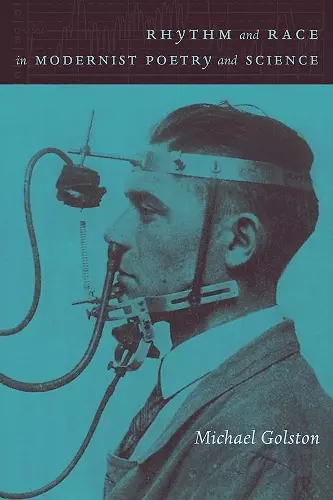Rhythm and Race in Modernist Poetry and Science
Pound, Yeats, Williams, and Modern Sciences of Rhythm
Format:Hardback
Publisher:Columbia University Press
Published:8th Jan '08
Currently unavailable, and unfortunately no date known when it will be back

Rhythm and Race in Modernist Poetry and Science is without question the best book on poetic rhythm. Measure lies at the heart of what makes poetry poetry-and perhaps this is why the topic has always excited such surprisingly heated controversy. Unlike most writers on the subject, however, Golston never looses his critical cool, and the result-both readable and rigorous-is an exemplary work of scholarship: astonishingly imaginative yet always firmly grounded in fact. By historicizing the idea of 'rhythm' itself, Golston recovers the ideology of rhythm at the heart of Modernism, in which politics and poetics cannot be disentangled. In the process, Rhythm and Race in Modernist Poetry and Science makes Modernist poetry-from Yeats to Pound to Williams-seem once again as strange and fascinating and inventive as ever. -- Craig Dworkin, associate professor of English, The University of Utah In his wide-ranging and meticulously researched study, Michael Golston reconstitutes a forgotten archive of Modernist concerns with the connections between rhythm and the human body shaped by nation, culture, and geography. The brilliantly argued chapters on Pound and Yeats show how these two central figures of Modernist poetry were influenced by Rhythmics and transformed it into a distinctively Modernist poetics that fused formal innovation with ideology. The fascinating concluding chapter on William Carlos Williams points the way to some of the contemporary poetic experiments with 'measure' that we have come to call postmodernist. Golston's innovative, interdisciplinary, and lucidly argued analysis changes the way in which we understand the relation of form and ideology in Modernist art and literature and opens up new areas of research for contemporary poetry. -- Ursula K. Heise, associate professor, English and comparative literature, Stanford University
In the half-century between 1890 and 1950, a variety of fields and disciplines, from musicology and literary studies to biology, psychology, genetics, and eugenics, expressed a profound interest in the subject of rhythm. This book examines psychological and physiological experiments that proved that races responded differently to rhythmic stimuli.In the half-century between 1890 and 1950, a variety of fields and disciplines, from musicology and literary studies to biology, psychology, genetics, and eugenics, expressed a profound interest in the subject of rhythm. In this book, Michael Golston recovers much of the work done in this area and situates it in the society, politics, and culture of the Modernist period. He then filters selected Modernist poems through this archive to demonstrate that innovations in prosody, form, and subject matter are based on a largely forgotten ideology of rhythm and that beneath Modernist prosody is a science and an accompanying technology. In his analysis, Golston first examines psychological and physiological experiments that purportedly proved that races responded differently to rhythmic stimuli. He then demonstrates how poets like Ezra Pound, W. B. Yeats, Mina Loy, and William Carlos Williams either absorbed or echoed the information in these studies, using it to hone the innovative edge of Modernist practice and fundamentally alter the way poetry was written. Golston performs close readings of canonical texts such as Pound's Cantos, Yeats's "Lake Isle of Innisfree," and William Carlos Williams's Paterson, and examines the role the sciences of rhythm played in racist discourses and fascist political thinking in the years leading up to World War II. Recovering obscure texts written in France, Germany, England, and America, Golston argues that "Rhythmics" was instrumental in generating an international modern art and should become a major consideration in our reading of reactionary avant-garde poetry.
This book deserves to change how we understand the place of rhythm in modernism. -- Leonard Diepeveen Modernism / Modernity
- Winner of Louis Martz Prize 2008
ISBN: 9780231142762
Dimensions: unknown
Weight: unknown
296 pages